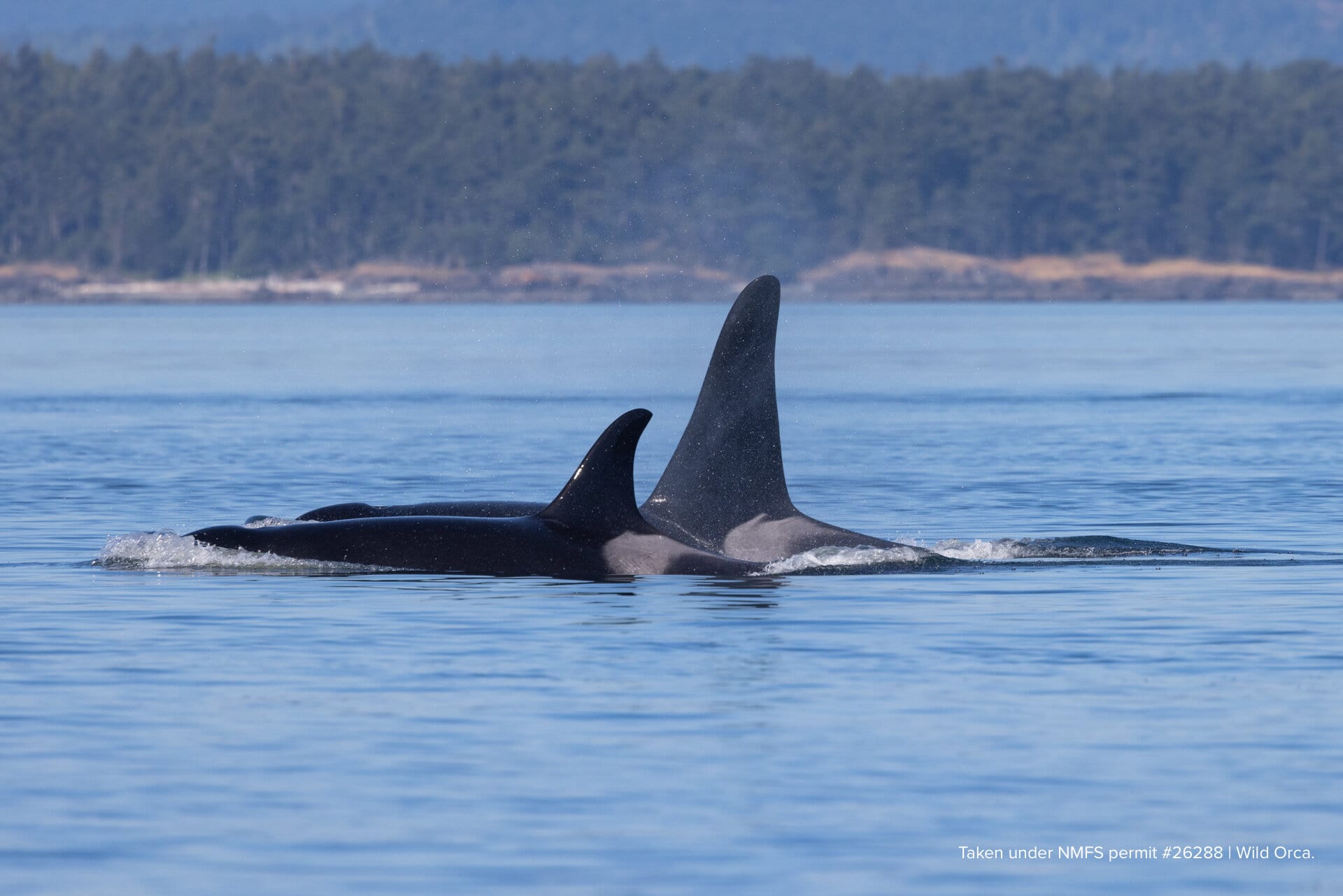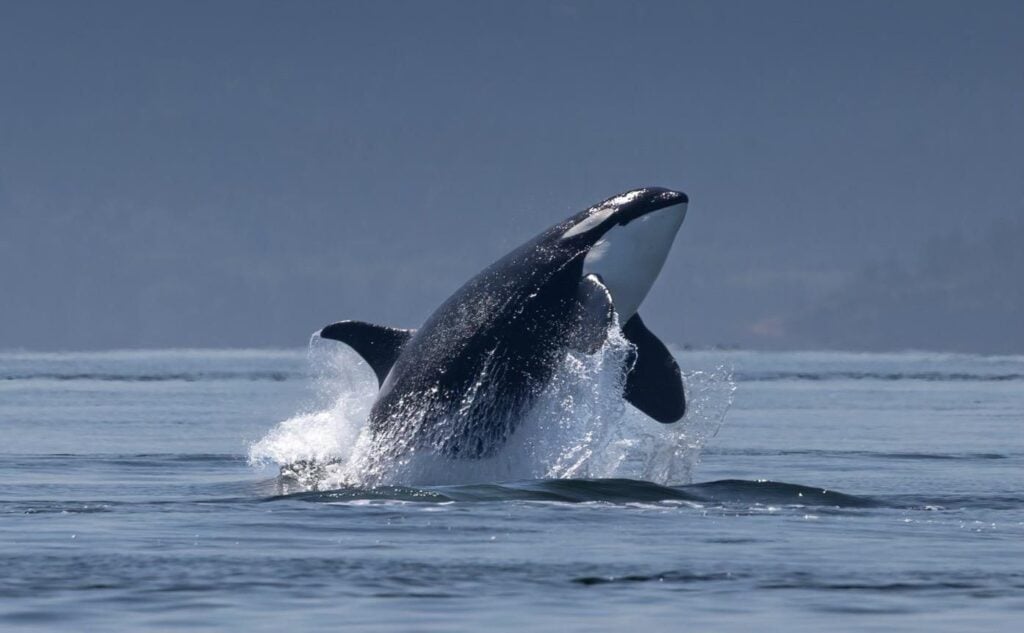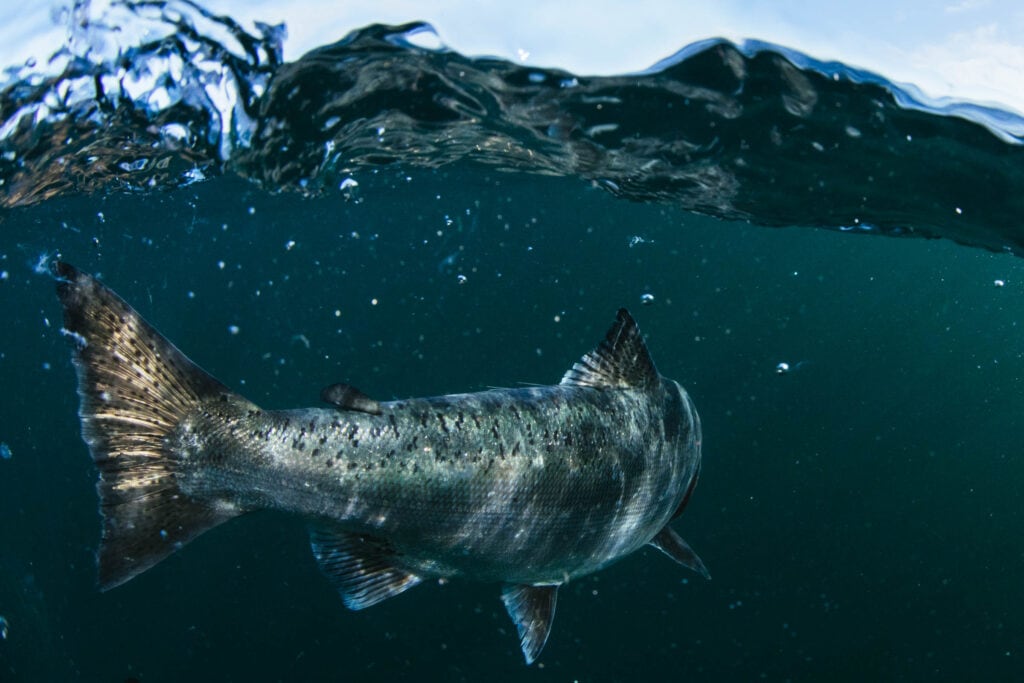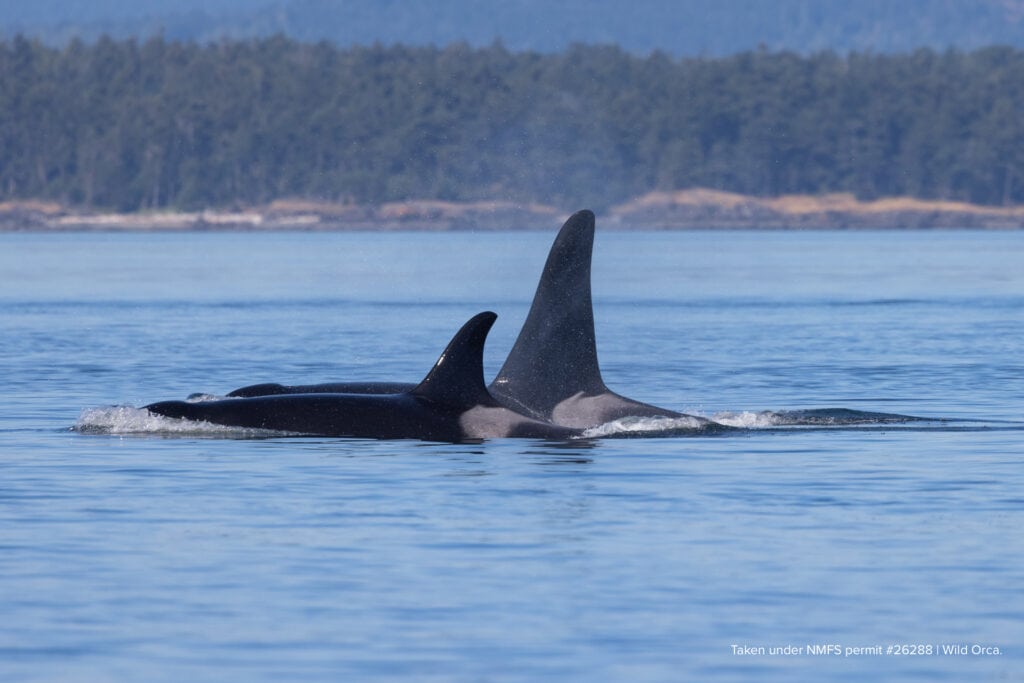

“After a hard-fought, four year legal challenge against the federal government, state of Alaska, and Alaska’s commercial fishing industry, Wild Fish Conservancy is thrilled to share a major landmark victory that is being celebrated coastwide as one of the most impactful recovery actions for wild Chinook and Southern Resident killer whales in decades.”
Emma Helverson, Executive Director, Wild Fish Conservancy
In an international, coastwide environmental victory, Seattle’s federal Court issued a landmark order that will immediately halt the overharvest and interception of Chinook salmon in Southeast Alaska that has persisted for decades and is jeopardizing the survival of the endangered Southern Resident killer whales and wild Chinook populations coastwide.
Earlier this week, U.S. District Judge Richard A. Jones issued a major final ruling in a lawsuit filed by Wild Fish Conservancy in March 2020 challenging NOAA Fisheries’ for authorizing overharvest in Southeast Alaska that the agency acknowledges is threatening the survival of both the Southern Resident killer whales and wild Chinook populations coastwide.
In a previous ruling in August, the Court overwhelmingly agreed that NOAA Fisheries violated environmental law when they allowed the Chinook troll fishery in Southeast Alaska to harvest at unsustainable levels that are pushing the endangered Southern Resident killer whales (SRKW) and threatened Chinook closer to extinction. This week, the Court agreed that given these serious violations, halting the summer and winter seasons of the commercial fishery is the most appropriate remedy to protect both iconic and imperiled species, until NOAA Fisheries can correct and address these violations.
Most people are surprised to learn that up to 97% of all Chinook harvested in the Southeast Alaska troll fishery actually originate from rivers throughout Oregon, Washington, and British Columbia. Roughly half of these fish would migrate back to the Columbia River basin. These fish are being intercepted during their historical migration, preventing them from reaching their home spawning grounds or migrating back down into southern waters where the Southern Resident killer whales encounter them. The vast majority of these Chinook are from priority stocks for the orca population.
This significant decision will finally provide the starving Southern Resident population far greater access to their primary prey, marking a turning point for their recovery. Following years of inaction by our federal government to address the whale’s prey crisis, the Court’s decision is being celebrated as what is likely the most important and impactful recovery action for the Southern Resident population since they were first identified as ‘Endangered’ in the early 2000’s.
In the face of wild Chinook populations collapsing in rivers from California to Alaska, the Court’s landmark decision is also being hailed as a major victory for wild Chinook recovery at an international and coastwide scale. Beyond the short-term and immediate benefit to the whales, the Court’s decision will allow far more wild Chinook to return home and reach their natal spawning grounds, aiding the recovery of Chinook populations in rivers throughout Oregon, Washington, and British Columbia. Allowing more wild Chinook to reach spawning grounds provides the greatest chance of restoring the larger, more diverse, and more fecund life histories of wild Chinook the whales evolved to eat and which are fundamental for their long-term recovery.

We want to emphasize that Alaskan fishers are not at fault for NOAA’s chronic mismanagement of this fishery, and we are sincerely sympathetic to the burden this decision will pose to Southeast Alaskan communities. The fault lies with government fisheries managers for consistently approving unsustainable harvest plans that have failed fishers, wild salmon, and Southern Resident killer whales.
Beyond the harm to Alaskan fishers, by allowing the overharvest and interception of Chinook from rivers throughout the coast to occur over so many decades, NOAA’s management has impacted and harmed many other tribal, First Nation, and coastal communities in British Columbia, Washington, and Oregon whose local Chinook are being harvested far from home. In many cases, these communities have been forced to disproportionately shoulder the burden of wild salmon and orca recovery, while sacrificing their own cultural, social, and economic relationship with wild salmon. The Court’s decision is finally addressing this historic inequity and restoring control to communities coastwide over the destiny of salmon recovery in their home watersheds.
Since the Southern Residents were first listed in the early 2000’s, Wild Fish Conservancy has spent thousands of hours working to raise awareness of the role overharvest has played in both species decline and seeking every possible avenue to educate and advocate for decision-makers to take action to address this urgent problem. Nearly two decades later, with little progress made and both species continuing to decline toward extinction, we knew we had no choice left but to take legal action to hold the government accountable for putting commercial harvest ahead of its duty to protect and restore threatened and endangered species.
We applaud the Court’s decision that will have wide sweeping and long-lasting benefits for the Southern Residents, wild salmon recovery, and communities throughout our coast. We want to sincerely thank our staff, attorneys, expert witnesses, standing declarants, and our entire community of members and supporters. Without your dedication and support, this incredible success would never have been possible. Much like our recent environmental victory banning commercial net pen aquaculture in Washington state, this landmark ruling is another example of how your support is leading to some of the most impactful recovery actions for these species at an international and coastwide scale.
We hope you’ll consider making a donation today to help make more environmental victories possible for wild fish and all who depend on them. Keep reading below to dive deeper into background of this landmark case.

A LANDMARK CASE FOR RECOVERY
Wild Fish Conservancy first brought this lawsuit after NOAA Fisheries released their most recent Endangered Species Act analysis evaluating the Southeast Alaska Chinook troll fishery’s impact on threatened and endangered species.
In that biological opinion, NOAA admitted that over the last decade and persisting today, Chinook harvest is occurring at levels that are unsustainable for the long-term survival and reproductive success of both threatened wild Chinook populations and endangered Southern Resident killer whales. Instead of issuing a jeopardy finding or requiring reductions in harvest, NOAA authorized the harvest to continue at these unsustainable levels relying on speculative mitigation measures the agency claimed could offset this serious harm.
In March 2020, Wild Fish Conservancy filed suit in Seattle’s federal Court against NOAA for allowing overharvest the agency admits is harming federally protected orcas and wild Chinook to continue and challenging the agency’s flawed and unproven mitigation.
In summary judgement in August, the Court overwhelmingly agreed the mitigation was insufficient and therefore NOAA’s biological opinion and approval of the fishery seriously violated the Endangered Species Act (ESA). The Court also agreed NOAA violated the law by ignoring their responsbility to conduct comprehensive environmental review of the proposed mitigation to ensure it would not further harm wild Chinook or killer whale recovery. This review would have included opportunities for public input and an evaluation of alternatives, such as reductions in harvest.
This week, U.S. District Judge Richard A. Jones issued a final ruling in the case remanding NOAA Fisheries’ inadequate biological opinion and ordering the agency to address the serious underlying violations of environmental law previously found by the Court. In the interim, the Court agreed that halting the summer and winter seasons of the Southeast Alaska Chinook troll fishery is the most appropriate remedy to protect the endangered Southern Residents from further harm.
The Court stated: “Though there is uncertainty as to how much prey would ultimately reach the SRKW, the record before the Court suggests that closure of the fisheries meaningfully improves prey available to the SRKW, as well as SRKW population stability and growth, under any scenario.”
We applaud the Court for this precautionary and science-based decision that is already being celebrated by communities throughout the Pacific Coast.

A TURNING POINT FOR THE SOUTHERN RESIDENTS
The Southern Resident killer whales were first listed as Endangered in 2005 under the U.S. Endangered Species Act (ESA) and in 2001 under Canada’s Species at Risk Act (SARA). Today, there only 73 individuals in the population, an alarming decrease from nearly 100 only 25-years ago. Reduced prey availability, specifically large and abundant wild Chinook, has been identified by killer whale experts and NOAA as the primary cause of their decline. Research has shown an alarming 69% of Southern Resident killer whale pregnancies are aborted due to insufficient Chinook salmon. The decline of the population has also been found in a recent study to contribute to symptoms of inbreeding depression.
Local killer whale scientists Dr. Deborah Giles (Science and Research Director, Wild Orca) submitted expert declarations as part of this case speaking to the health and condition of the whales. In her final declaration, she concluded:
“It is my professional opinion that SRKW, under existing conditions, are not getting enough Chinook salmon throughout their entire range. Overall conditions appear to have worsened as Chinook returns through the Salish Sea, but also to the Columbia River Basin, have been insufficient to maintain their daily prey energy requirements throughout the past few years. I believe SRKW need an immediate increase in the abundance of Chinook available to them to avoid functional extinction, as the current low birth rate, with high early mortality is simply unsustainable.”
In a separate expert declaration evaluating the effect of the troll fishery’s harvest on the Southern Resident population, conservation biologist Dr. Robert E. Lacy projected closing the fishery would increase prey availability by approximately 6%, which would be enough to stabilize the population and stop their decline toward extinction, though additional actions would be required to begin to grow the population. Stopping the decline of the whales toward extinction is the highest priority toward recovery efforts. While there are many factors beyond harvest that need to be addressed, Dr. Lacy’s findings clearly demonstrate how significantly overharvest in Southeast Alaska was affecting the whale’s prey availability and validates why the Court’s decision this week is so critically important to the survival of this population.
“This is unbelievable news, yet so long in coming. The high pregnancy failure rate within the Southern Resident killer whale population is linked to poor nutrition, so having more fish returning to their home waters in British Columbia, Washington, and Oregon, will increase the whales’ prey base and improve their chances of giving birth to healthy calves.”
Dr. Deborah Giles, Wild Orca | wildorca.org

THE SOUTHEAST ALASKA TROLL FISHERY
Given the fishery at issue in this case occurs in marine waters outside of Southeast Alaska, most people are surprised to learn that the vast majority of fish harvested in the fishery are not Chinook that originate from Alaskan rivers. To the contrary, harvest data has consistently shown for decades that every year up to 97% of all Chinook harvested in the Southeast Alaska troll fishery actually originate from rivers throughout Oregon, Washington, and British Columbia. Roughly half of these fish would migrate back to the Columbia River basin.
Much like migratory birds, wild Chinook populations evolved over thousands of years to migrate from rivers throughout the Pacific Northwest to the food-rich, marine rearing habitat or ‘salmon nursery’, located in the ocean outside of Southeast Alaska. The salmon nursery is where the Southeast Alaska troll fishery has been authorized to harvest by NOAA Fisheries over 10 months of the year. Majority of the Chinook harvested in the fishery are from priority stocks for the Southern Residents and many are listed as Threatened by the U.S. and Canada. These fish are being intercepted during their migration, preventing them from reaching their home spawning grounds or migrating back down into southern waters where the Southern Resident killer whales encounter them.
As a result of yesterday’s decision, approximately 172,000 Chinook that would have been harvested or indirectly killed in the 2023 summer and winter seasons of the Southeast Alaska troll fishery will now be able to continue their historical migration south to home spawning grounds and into the whale’s key foraging areas.
The underlying harvest issues in this case are not an anomaly, but rather just one example that demonstrates the problems caused when salmon are harvested in the ocean where it is impossible to avoid unintentionally harming threatened and endangered populations or intercepting high proportions of salmon from rivers coastwide. Scientists are increasingly calling for harvest reform measures that shift harvest out of the ocean and into fisheries in or near each river of origin where salmon return, providing fisheries managers and coastal communities the ability to manage recovery with far greater accuracy and success.
Learn more about Wild Fish Conservancy work and research helping to advance responsible, resilient commercial fisheries and consider making a donation to support these ongoing efforts.
WHAT HAPPENS NEXT?
As it currently stands, the state of Alaska and any participating commercial fishers would be in violation of the Endangered Species Act if they open or participate in the summer commercial troll Chinook salmon season starting July 1st, 2023. An appeal, and cross appeal, has been filed in federal court by both parties. Unless the defendants win a stay on the remedy, that ruling will stand until the appeal arguments play out. Wild Fish Conservancy remains confident in our case, and will stand behind our scientific and legal positions for Wild Chinook and Southern Resident killer whales.
Further Reading:
Join our mailing list to recieve important updates on our work, the latest wild fish news, & opportunities to take action to support wild fish.
This site is protected by reCAPTCHA and the Google Privacy Policy and Terms of Service apply.
Wild Fish Conservancy is recognized as a 501(c)3 non-profit by the IRS